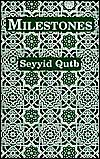In my Philosophy of Religion course, this week we are reading excerpts from the Koran and Seyyid Qutb’s influential Milestones.
The Koran has many bloodthirsty passages as well as many suggesting qualified live-and-let-live policies. So we take up the question of whether Islam is essentially a religion of violence or peace.
 Qutb offered an influential (on Osama bin Laden, for example) politicized interpretation of Islam, which is usually labeled Islamism. Qutb argues that Islam is a religion of peace, as long as one defines “peace” accurately:
Qutb offered an influential (on Osama bin Laden, for example) politicized interpretation of Islam, which is usually labeled Islamism. Qutb argues that Islam is a religion of peace, as long as one defines “peace” accurately:
“When Islam strives for peace, its objective is not that superficial peace which requires that only that part of the earth where the followers of Islam are residing remain secure. The peace which Islam desires is that the religion (i.e., the Law of the society) be purified for God, that the obedience of all people be for God alone.”
Qutb calls for a “vanguard” of dedicated religious warriors who will fight the corruption of the world caused by all other belief systems — and who should expect to die either in battle against enemy forces or as martyrs.
 “The highest form of triumph is the victory of soul over matter, the victory of belief over pain, and the victory of faith over persecution.”
“The highest form of triumph is the victory of soul over matter, the victory of belief over pain, and the victory of faith over persecution.”
Those who so succeed will earn Allah’s highest honor:
“All men die, and of various causes, but not all gain such victory. It is God’s choosing and honoring a group of people who share death with the rest of mankind but who are singled out from other people for honor.”
Also check out Virginia Murr’s “The Power of Ideas: Sayyid Qutb and Islamism”, first posted in 2004.
Dr Hicks writes: “The Koran has many bloodthirsty passages as well as many suggesting qualified live-and-let-live policies.”
I haven’t found what I would consider “many” passages in the Koran that present a “live-and-let-live” view. Not even in the Meccan verses.
If the verses are arranged in chronological order (rather than in the way they are arranged in the default Koran) they seem to start with the adamant proclamation that Mohammed is the Messenger of Allah (whose message is that he’s the Messenger of Allah) and then get progressively more enraged and outright insulting to any Kafir who merely raises a question or doubt.
Many claim that the Meccan verses are tolerant. In my study of them, I haven’t found them to be so. Not even a tiny bit.
If we read the verses from the perspective of Mohammed — i.e. What is he trying to convey with each revelation? What is he responding to and to what end? — the verses offer no wiggle room for alternative beliefs or perspectives.
That’s my humble observation for what it’s worth.
I was actually going to say nearly the reverse of what Prodos says above. I don’t think there are all that many bloodthirsty passages in the Qur’an (or live-and-let-live ones, for that matter), at least if “bloodthirsty” refers to human/human interactions. Compared with the Hebrew Bible or the Iliad, the Qur’an comes across as a Boy Scout Manual. But even apart from such comparisons, taken on its own, I think the Qur’an’s bloodthirstiness has been greatly exaggerated. Virtually every “bloodthirsty” passage is a divine pep talk for a retaliatory strike against someone who’s presumed to have attacked first. This isn’t an absolute, but it covers the majority of belligerent passages in the Qur’an (e.g., 2:191, 9:5). To describe such passages as “bloodthirsty,” we’d have to say that there was something that distinguished them from the pep talks that other commanders give their troops in any defensive battle. I don’t see it.
I think we’ve come to see the Qur’an as specially bloodthirsty because we have adopted a bizarrely sanitized, euphemistic vocabulary when it comes to discussing warfare (e.g., “collateral damage,” “targeted strikes,” “surgical strikes,” “strategic depth,” etc.) and have come dogmatically to assume that those who speak euphemistically about warfare are morally superior to those who describe it more vividly. When Leonard Peikoff suggested that the “Ground Zero Mosque” be blown up, he was rather genteel about how he put things. When he suggested that the state of Iran be “ended,” one didn’t get the impression that what he was suggesting involved the annihilation of millions of people.
In other words, this may not sound bloodthirsty, but it involves a level of carnage that far exceeds what the Qur’an instructs Muslims to do to the infidels:
“Eliminating Iran’s terrorist sanctuaries and military capability is not enough. We must do the equivalent of de-Nazifying the country, by expelling every official and bringing down every branch of its government. This goal cannot be achieved painlessly, by weaponry alone. It requires invasion by ground troops, who will be at serious risk, and perhaps a period of occupation. But nothing less will “end the state” that most cries out to be ended.” “
I was going to add, Peikoff strikes me as bloodthirsty; the Qur’an strikes me as militarily run-of-the-mill.
Thanks to Irfan Khawaja for his comment
He writes:
“I think the Qur’an’s bloodthirstiness has been greatly exaggerated …”
“Virtually every ‘bloodthirsty’ passage is a divine pep talk for a retaliatory strike against someone who’s presumed to have attacked first.”
I was focusing on the Meccan verses which do not contain acts of physical violence. And I did not use the term “bloodthirsty” (nor does Irfan claim I did).
I contend that the Meccan verses are not peaceful or tolerant as often claimed. That’s not to say that they are violent. But they strike me as creating an inevitable preparation for violence.
The Meccan verses repeatedly and relentlessly condemn and insult the Meccans, their ancestors, their beliefs, and their gods, for not accepting Mohammed as the Messenger of Allah and for questioning Mohammed’s claim of such a status and for mocking Mohammed’s claim and for rejecting Mohammed’s claim.
At no point does Mohammed offer any evidence of his claim. Nor does he offer any evidence that he is knowledgeable in religion or history or ethics. He does not seem to offer any evidence of either extensive knowledge or extensive wisdom, as far as I can see. I have been very surprised to discover this.
It’s particularly odd to me that Mohammed draws on — actually, just touches on — various biblical stories but offers inaccurate accounts of them.
Whether it’s the story of Noah or Moses or Abraham, all the stories, when re-told by Mohammed, are reduced to: “Look what terrible things befell those people who rejected the claim made by each of these prophets/messengers when people rejected their claim of being prophets/messengers of Allah”.
These re-told stories seem, to me, intended to be a warning to the Meccans, along the lines of: “And if you, in the same way, reject me, the same will befall you”.
This would come across as unconvincing and even ridiculous to the Meccans — even if Mohammed really was the Messenger of Allah.
It would be like me saying: “Louis Pasteur offered a theory that was rejected and mocked. But he turned out to be right. My theory is rejected and mocked. And I, too, will turn out to be right.”
Maybe. Maybe not.
None of the above is any sort or rebuttal to Irfan’s comment. It is merely an elaboration of my own, earlier comment.
But here’s the rub …
When Irfan writes: ” every ‘bloodthirsty’ passage is a divine pep talk for a retaliatory strike against someone who’s presumed to have attacked first.”
… yes, that is so. However, the word “presumed” is problematic for me. Highly problematic.
The two issues I have are:
1. How does Mohammed determine who “attacked first”?
2. What does Mohammed believe is an appropriate retaliation?
Also, the problem with a Koran-only analysis, is that the Koran, in my humble view, is insufficient on its own. We really do need to also draw on the Hadith and the Sira. True?
That’s all for the moment.
I welcome criticism and further discussion. Thanks. 🙂
Prodos,
We’re not really disagreeing. I was responding originally to Stephen’s post, not your comment. My point was simply that the Qur’an is not particularly bloodthirsty as ancient texts go (or even as modern war-talk goes). I wasn’t saying its claims are defensible. They’re not. Also, I was restricting what I was saying to human-human interactions, i.e., human warfare. I wasn’t referring, for instance, to divine punishment in the afterlife (i.e., Hell). The Qur’an is pretty bloodthirsty in its descriptions of Hell. But Hell and warfare are different subjects.
The Meccan surahs aren’t peaceable, but they’re not focused on warfare, either. Even a verse like Al Adiyat (100) alludes to warhorses, but isn’t really about warfare. It’s about the need to worship God. There’s nothing particularly bloodthirsty there unless a mere reference to warhorses is bloodthirsty.
That the Meccan surahs (that the whole Qur’an) is rationally unconvincing is true, but has nothing to do with its bloodthirstiness or brutality. If I were a Meccan, I would have been an unbeliever, and pointed out that Muhammad’s message made no sense. But that doesn’t prove that his conception of warfare was particularly brutal. It just proves that what he was saying made no sense.
Exhibit A for the distinctively belligerent nature of the Qur’an is supposed to be verse 2:190-96. But that verse is about the limits of military force. This is the whole message: Fight those who fight you, but observe limits; if they fight you, kill them; fight until victory unless they surrender, in which case, stop fighting; as long as they’re the ones aggressing, fight them anywhere they are without worrying about fighting within religious sanctuaries. That doesn’t strike me as a particularly belligerent message.
As for giving a criterion for aggression and defense, there’s no such criterion to be found in the Qur’an. I wasn’t saying that there was. How does Muhammad discover who attacked first? On a completely ad hoc basis. But in that respect, there is no difference between Muhammad and Machiavelli, and I wouldn’t call Machiavelli’s Prince a particularly brutal text, at least by the standards of his day (or even ours).
The Qur’an is certainly insufficient on its own to guide anyone to any goals worth achieving. It points in the direction of hadith and sira, but the problem is, the Qur’an not sufficient to tell you which hadith and sira to read in order to interpret the Qur’anic text. So appeal to the hadith and sira don’t really solve anything, and don’t really prove anything, either.
Suppose a certain Quranic verse is unclear or indeterminate. Now we decide to appeal to hadith and sira. Well, there are many versions of both. If the original Qur’anic verse was unclear in its basic meaning, the Qur’anic text is bound to be unclear about which version of hadith or sira to read. Suppose you read one hadith collection, and I read another, and they say contrary things. In that case, the Qur’an will never be able to decide between them–we went to the hadith to figure out what the Qur’an was saying in the first place! If we can’t figure out what God was commanding us to do, we aren’t going to figure out what book God wanted us to read to figure out what God was commanding us to do. So I appeal to hadith and sira very sparingly, just to clarify some basics. After that, I regard it as essentially worthless.